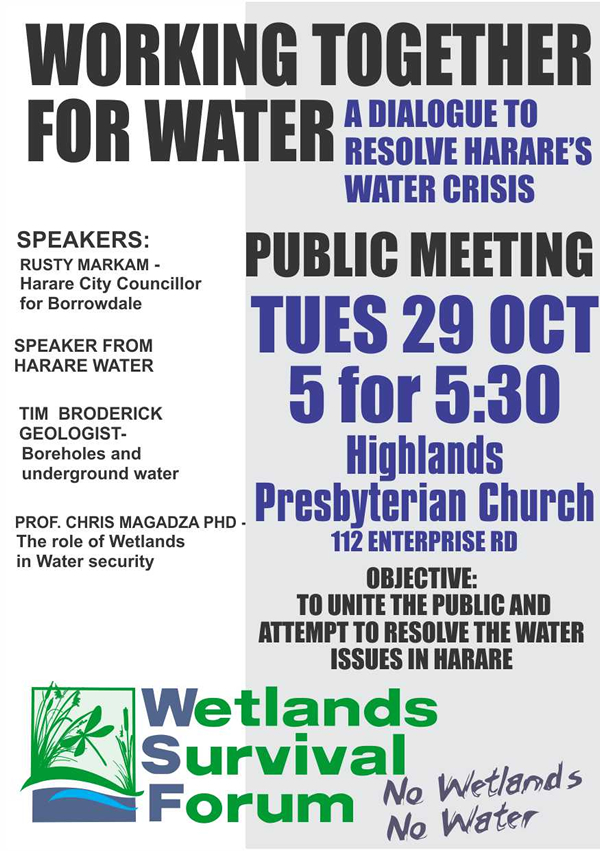I went to the public dialogue on the Harare water crisis organised by the Wetlands Survival Forum last week.
I found the meeting, and the conversations I had with participants afterwards, both illuminating and infuriating.
Harare’s water situation is in a crisis. It was good to hear Mayor Manyenyeni acknowledge that, but as he also noted we are at least five years away from a solution – And a lot longer if the behaviour of both Harare residents and leadership doesn’t change.
Issues of urban cultivation, litter, development on wetlands, watering of lawns, the city’s decrepit infrastructure of pipes, siltation in Lake Chivero, the proliferation of boreholes and bulk water abstraction are all contributing to a dire water situation for Harare. According to one person I spoke with after the meeting, Harare’s water system will collapse within the next ten years unless large scale changes are made. It simply won’t be able to keep up with the growing demand and the steadily reducing supply.
There are some very basic things each of us can do to make a difference, like
- Don’t water your lawn, and speak with your neighbours, workplace and others about the negative impact a green lawn has on all of us
- Shower into a bucket and use that “grey water” to then fill your toilet cistern
- Place bricks wrapped in plastic (so they don’t crumble) or 500mL plastic water bottles in your toilet’s cistern so it uses less water with each flush (especially for older toilets, which typically had larger tanks)
- If it’s just urine, don’t bother to flush – Every flush of the toilet wastes a lot of water
- Don’t litter. The plastic you throw out on the road will likely get taken into a storm drain in the rains, and make its way to Lake Chivero, where it adds to the pollution choking the city’s filtration system
- Look into rain water harvesting. At a large or small scale, effectively capturing the rain water that does fall and bringing it back into the household for use would reduce the demand on both boreholes and the city’s water supply
But in addition to individual actions, there is a massive need for collective action. Speaking at the meeting, Councillor Mutizwa (Ward 9) said that local government’s concerns about some wetlands development projects had been overruled by national government, despite legislation like the Environmental Management Act which protects wetlands. In order to change Harare’s water situation, local and national government needs to be engaged. The Wetlands Survival Forum was set up to try and coordinate groups around the water issue – so support its efforts and get involved with it where you can. You can like them on Facebook to follow their activities, or email wetlandssurvivalforum [at] gmail [dot] com to get involved.










